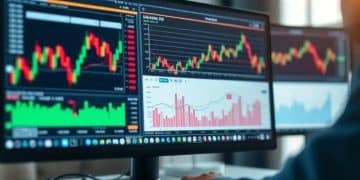Expert analysis on global markets: what’s next?

Investing in emerging markets offers potential high returns but involves significant risks due to market volatility, economic instability, and political factors that investors must carefully navigate.
Expert analysis on global markets sheds light on the intricate forces shaping economies worldwide. Have you ever wondered what influences these changes? Let’s dive into how these factors impact your investments.
Understanding global market dynamics
Understanding the dynamics of the global market is crucial for anyone involved in finance or investing. Each market operates within a unique set of conditions that can change rapidly. Recognizing these factors can enhance decision-making and lead to better investment outcomes.
What Influences Global Market Dynamics?
Several factors drive the behavior of global markets. These include economic indicators, political stability, and trade relations. For instance, fluctuations in interest rates can significantly impact currency strength and stock prices worldwide.
Key Factors to Monitor:
- Economic growth rates: These determine market potential and investment attractiveness.
- Inflation rates: High inflation can erode purchasing power and influence interest rates.
- Government policies: Regulations can either facilitate or hinder market operations.
- Global events: Political unrest or natural disasters can lead to market volatility.
By keeping an eye on these influences, investors can better navigate the global market landscape and anticipate trends. Knowledge about one country can impact perceptions about another due to interconnected economies. Understanding these interdependencies is key to formulating a successful investment strategy.
Additionally, consumer behavior plays a role in market dynamics. Changes in spending habits can shift demand, leading markets to react accordingly. For instance, a spike in demand for eco-friendly products can drive investment in sustainability-focused companies.
In conclusion, understanding global market dynamics requires continuous monitoring of various factors. The interplay of economics, politics, and consumer behavior creates a complex environment, but investors who stay informed are better positioned to succeed.
Key indicators influencing market trends

Key indicators play a significant role in understanding market trends. Being aware of these signals can help investors make informed decisions. There are several primary indicators that often guide market behavior, including economic reports, interest rates, and employment data.
Economic Reports
Economic reports provide insights into the overall health of an economy. These reports can include information on gross domestic product (GDP), retail sales, and manufacturing output. For instance, a rise in GDP usually signals economic growth, while declining retail sales can indicate consumer weakness.
Important Economic Indicators:
- Gross Domestic Product (GDP): Measures the total value of goods and services produced.
- Consumer Price Index (CPI): Reflects inflation trends, indicating cost-of-living changes.
- Unemployment Rate: Shows the percentage of the labor force that is unemployed, impacting consumer spending.
- Interest Rates: Set by central banks, they influence borrowing costs and spending.
Monitoring these indicators helps investors gauge potential shifts in the market. For example, when interest rates rise, borrowing costs increase, which can lead to lower consumer spending and impact corporate earnings.
Additionally, market sentiment can shift based on predictions surrounding these indicators. Analysts and investors often react to forecasts from economic reports. A positive outlook can boost confidence, whereas negative news may lead to caution.
Every investor should stay updated on these critical indicators as they can drastically shift market dynamics. Having a solid understanding of how these elements connect enables better positioning in a fast-moving global market. By analyzing trends in these indicators, investors can adapt their strategies to optimize returns effectively.
Investing in emerging markets
Investing in emerging markets offers unique opportunities for growth. These markets often present higher potential returns compared to developed ones. However, they also carry additional risks that investors must consider.
Why Consider Emerging Markets?
Emerging markets are typically characterized by rapid economic growth and industrialization. Investing in these regions can be appealing for several reasons. They often have expanding middle classes, which increases consumer demand.
Key Benefits of Investing:
- High Growth Potential: Emerging markets can grow significantly faster than mature economies.
- Diversification: Including these markets in a portfolio can reduce overall risk.
- Attractive Valuations: Many stocks in these regions may be undervalued compared to companies in developed markets.
- Access to New Markets: Investors can tap into innovative sectors poised for growth.
Despite the allure, investing in emerging markets is not without challenges. Investors should be aware of political instability, currency fluctuations, and regulatory risks. Each of these factors can impact investments significantly. Understanding local environments is crucial.
Another consideration is the importance of research. Investors should look for companies with strong fundamentals and a clear growth strategy. Analysis of economic indicators and trends in these regions can also provide useful insights.
In addition, staying informed about geopolitical developments can help mitigate risks. Changes in policies and trade relationships can drastically affect market performance. Therefore, a proactive approach to monitoring news related to emerging markets is essential.
Risks and opportunities in a volatile landscape

In any volatile landscape, understanding the risks and opportunities is essential for investors. Market fluctuations can present unique challenges, but they can also unveil potential profit-making avenues.
Identifying Risks
The unpredictability of volatile markets means investors must be cautious. Risks can arise from sudden market changes, economic downturns, and unforeseen global events. These factors can lead to significant financial losses if not managed properly.
Common Risks to Consider:
- Market Fluctuations: Prices can change rapidly, impacting investment values.
- Economic Uncertainty: Changes in economic indicators can lead to increased volatility.
- Political Instability: Governments’ actions can affect market confidence and investments.
- Currency Risks: In international markets, currency fluctuations can impact returns.
While risks are a reality, there are also numerous opportunities that can arise in these fluctuating conditions. For example, market corrections might allow investors to buy quality assets at lower prices. Identifying such opportunities can be crucial for building a strong portfolio.
Spotting Opportunities:
- Discounted Assets: Markets may undervalue certain stocks, providing buying opportunities.
- Sector Growth: Some sectors may thrive during volatility, creating investment chances.
- Market Timing: Understanding market cycles can help in making strategic investment moves.
- Diversification: Exploring multiple asset classes can reduce risk while tapping into various opportunities.
Investors need to be agile and informed to navigate this volatile environment successfully. Continuous research and staying updated on global events can empower investors to anticipate changes and adjust their strategies effectively.
In summary, understanding the risks and opportunities in a volatile market is essential for investors. By recognizing the potential dangers while also seeking out investment opportunities, you can make informed decisions that enhance your financial strategy. Continuous monitoring of market conditions and being adaptable in your approach will help you navigate the complexities of investing. Ultimately, balancing risk and reward can lead to successful investment outcomes.
\n\n
\n
FAQ – Understanding Risks and Opportunities in a Volatile Market
What are the main risks of investing in a volatile market?
The main risks include market fluctuations, economic uncertainty, and political instability, which can lead to financial losses.
How can I spot investment opportunities in a volatile market?
Look for discounted assets, sector growth, and patterns in market timing to identify potential investments.
Why is research important when investing?
Research helps you stay informed about market conditions and economic indicators, allowing you to make better investment decisions.
How can diversification help manage risks?
Diversification spreads your investments across various assets, reducing the impact of a downturn in any single investment.





